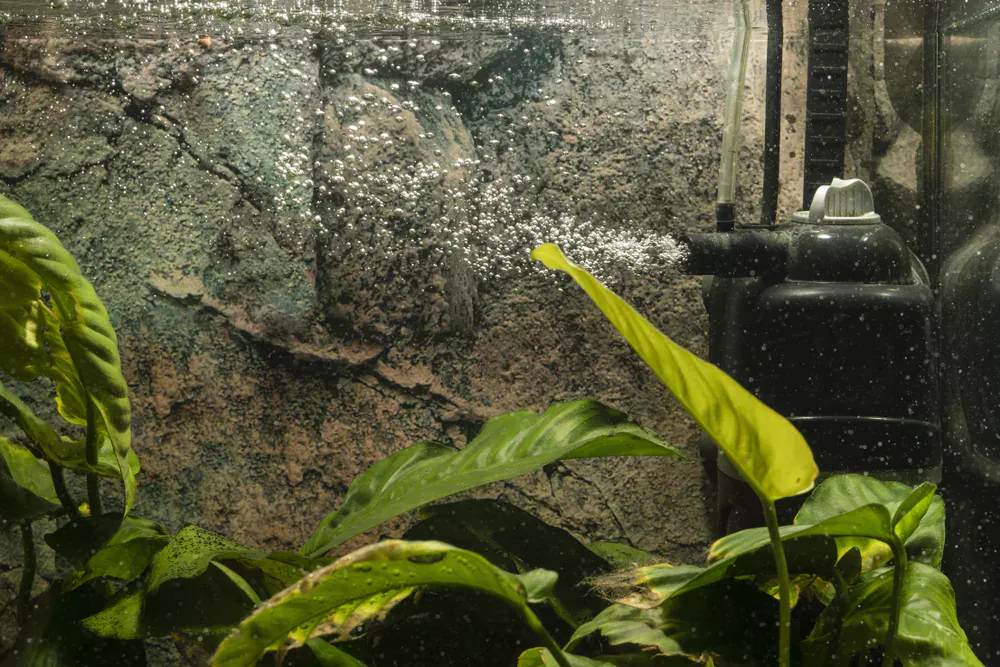Filtration is a major part of any home aquarium system. Additionally, it’s very important to keep the water quality in your home aquarium at a good level. But “Does Betta Fish Need A Filter?”.
It’s a harsh truth that many people have no idea whether or not do bettas need filters. Maybe you have seen youtube videos of bettas being kept in small bowls without any filter and now you are thinking the same? In this article, we’ll examine how the betta fish can be kept, and whether or not do betta need a filter. So let’s get started with the most basic question:
- 1 What Does A Filter Do In A Fish Tank?
- 2 How Does A Fish Tank Filter Work?
- 3 Does Betta Fish Need A Filter?
- 4 Reasons Why Does Betta Fish Need A Filter?
- 5 The Three Types of Filtration Methods
- 6 Different Types Of Filters
- 7 What Kind Of Filter Does A Betta Fish Need?
- 8 Benefits Of Having A Filter In Your Fish Tank
- 9 Downsides Of Having A Filter In Your Fish Tank
- 10 What To Look For In A Filter For Your Betta?
- 11 Frequently Asked Questions (FAQs)
- 12 Final Thoughts
What Does A Filter Do In A Fish Tank?
The main purpose of a fish tank filter is to keep your water clean and free of harmful toxins. The filter will remove any waste that your fish produce and help keep your water at the right temperature. Without a filter, your fish might be exposed to diseases and parasites that can kill them over time.
The other purpose of having a filter in your betta tank is that it provides oxygenation in the water so that your fish can breathe properly while they swim around looking for food!
How Does A Fish Tank Filter Work?
In an aquarium filter, water passes through various layers of filter media before being returned to the tank. The process removes debris from the water as well as larger particles that could clog other parts of your filtration system. Some filters also remove dissolved impurities from the water before returning it to your betta tank using carbon or another chemical process.
Many people think that filters only need cleaning when they start slowing down or stop working altogether. However, regular cleaning will improve the performance of your betta fish filter for longer without having to replace it as often!
Does Betta Fish Need A Filter?
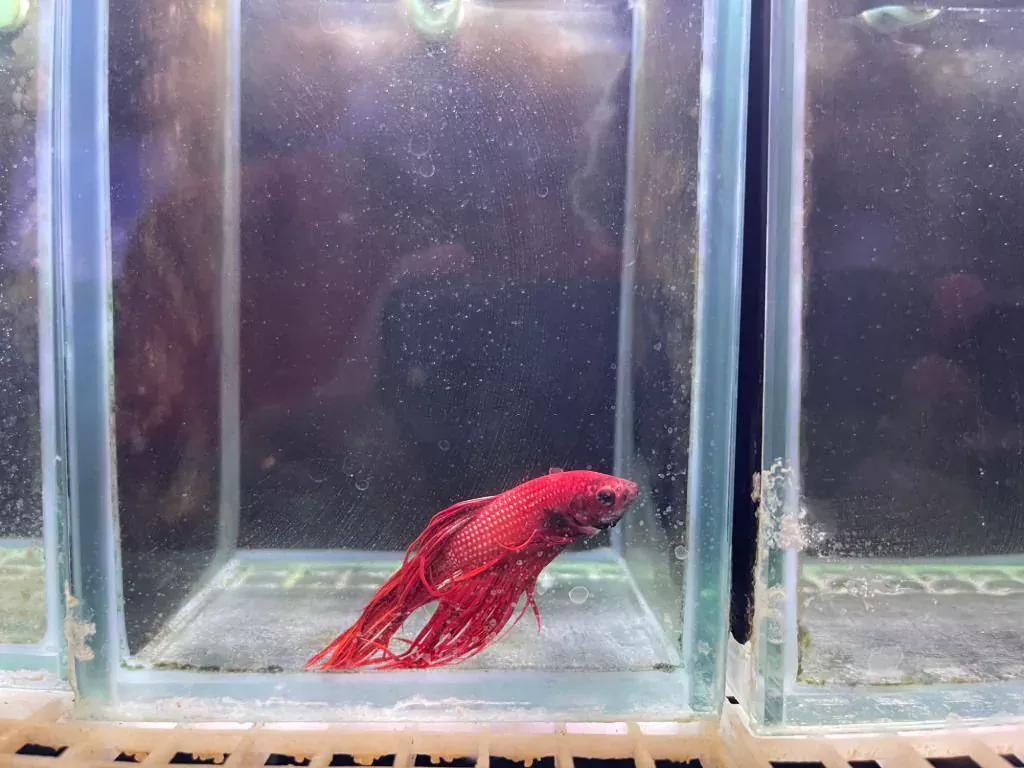
The answer to this question is not an absolute yes or no. The answer lies in the type of filter you use for your betta fish tank.
If you have a small, unfiltered aquarium, then yes, you can definitely keep a betta fish without using a filter. However, this will not be ideal for your fish.
In general, it’s best to have some sort of filtration system in place for your betta’s aquarium. This helps keep the water clean and healthy for your pet. It also helps prevent bacteria from building up inside the tank, which can make your betta sick if he ingests any contaminated water.
If you’re going to add a filter to your betta tank, make sure it has a flow rate that’s appropriate for its size. Otherwise, it won’t be effective at removing pollutants from the water (or at least not as effectively).
Reasons Why Does Betta Fish Need A Filter?
There are many reasons why does betta fish need a filter. And I am here to give you 11 of them!
- A filter will help keep your water clean and healthy for your betta.
- It reduces stress on the fish.
- A filter will remove waste from the water and even parasites if there is any present.
- A filter will keep your betta tank clean by removing debris from the surface of the water, which means less work for you!
- It prevents your betta fish from jumping out of the tank.
- It keeps algae at bay.
- It removes bad odors from the water and prevents them from returning.
- It makes it easier for you to spot illness in your fish.
- It reduces water evaporation from the tank, which means less frequent water changes for you
- Using a filter will reduce the amount of ammonia and nitrites in your tank
- A filter makes it easier for you to keep track of how much water needs changing because they make bubbles that float up to the surface of the tank and tell you when it’s time to do so!
The Three Types of Filtration Methods
1- Chemical Filter
Chemical filters work by adding chemicals to the water that act as a cleaning agent for the water. These chemicals can be added manually or automatically through an automatic dosing system. There are two types of chemical filtration: Activated Carbon and Ion Exchange Resins
Activated Carbon is made from coconut shells or other vegetable matter, which has been treated with steam and carbonized under high temperatures (1,200 degrees Fahrenheit). The result is a very porous material that attracts impurities in the water. Activated Carbon removes organic compounds such as ammonia and nitrites from the water by absorbing them into its pores. It also removes odors and discoloration because it attracts compounds with a negative charge such as chlorine and chloramines.
Ion Exchange Resins work by exchanging one ion for another ion in the aquarium environment, such as replacing nitrate with nitrite or potassium ions with hydrogen ions. They are usually made from strong polymers or synthetic resins that are charged positively or negatively by an electrical current applied during manufacturing so they attract certain types of ions and clean the water.
2- Biological Filter
This type of filter uses bacteria to remove impurities from water. Bacteria are added to the biological filter where they consume waste and release beneficial substances into the water that help keep fish healthy. This type of filter needs more maintenance than chemical filters because it needs more frequent cleaning, but it can be more effective at removing chemicals and harmful microorganisms than chemical filters alone.
3- Mechanical Filter
A mechanical filter is a device that physically removes solid particles from the water using mechanical filtration media (such as foam, floss, and sponge). Mechanical filters are usually used in conjunction with some form of biological filtration (activated carbon or bio-wheels) to remove dissolved organics from aquarium water.
They can also be used as an additional filtration step between mechanical and biological filtration. Mechanical filters are typically used in tanks where there is little or no plant growth and/or when there are few fish present in the tank (less than 10).
Different Types Of Filters
1- Corner Filter
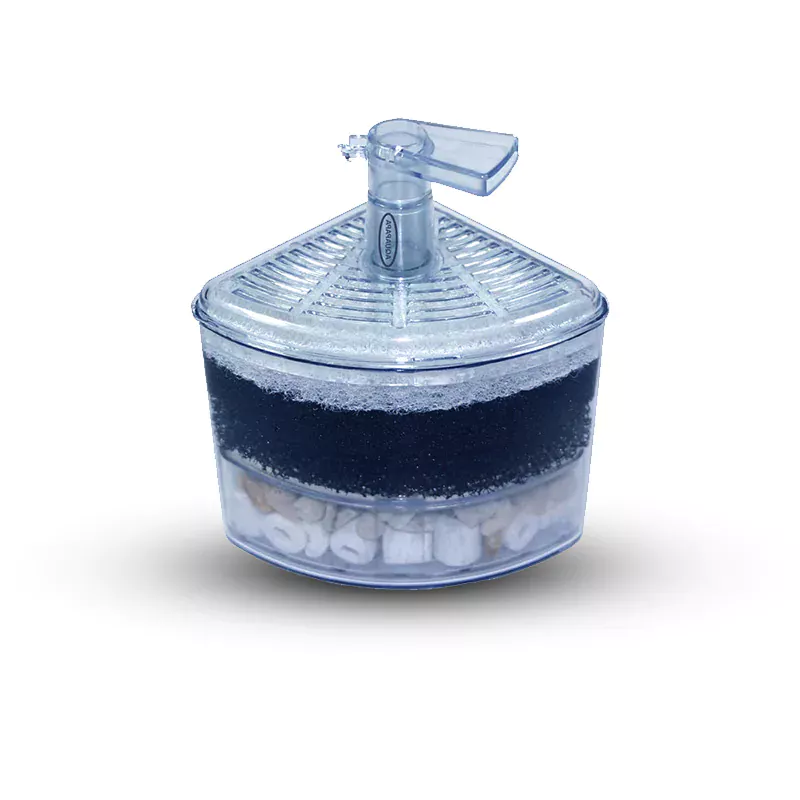
This is one of the most popular types of aquarium filter. Corner filters have a manifold that allows water to flow into the unit from several directions at once. They are easy to set up and don’t need any additional parts or pieces to make them work properly. Corner filters can be used with both freshwater and saltwater tanks, although they may require some adjustments depending on what type of water you want to use in your aquarium.
2- Sponge Filter
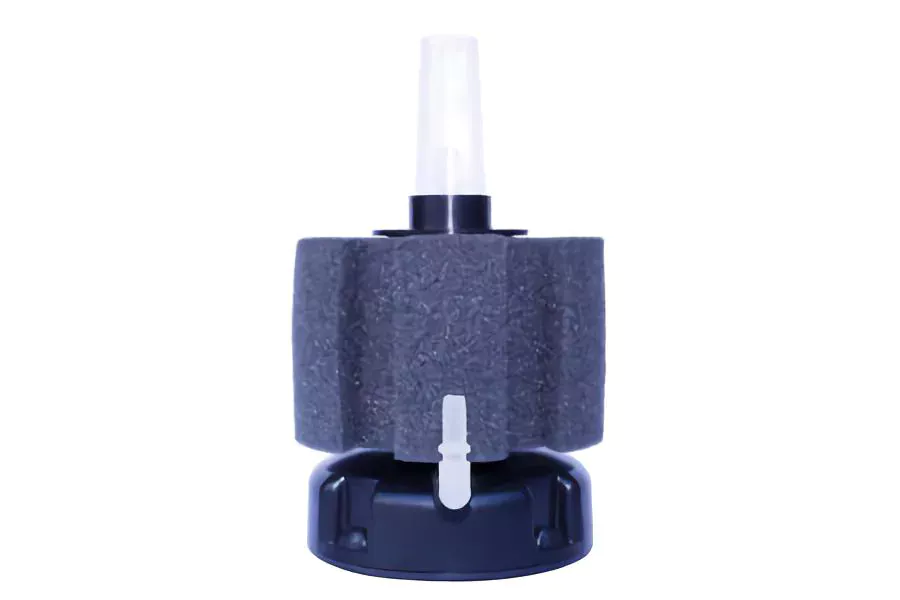
The sponge filter has a large round disk with lots of holes in it, which allows water to flow through and out of the filter easily. The sponge itself is often made from spongy material similar to foam rubber or felt, but sometimes it’s just plain fabric with no special treatment at all!
A lot of these filters come with small pieces of carbon already put inside them so they can remove chlorine and other chemicals from your water before they go back into your tank again. You can also buy these carbon pieces separately if you need them for another purpose!
3- Hang-on-Back Filter
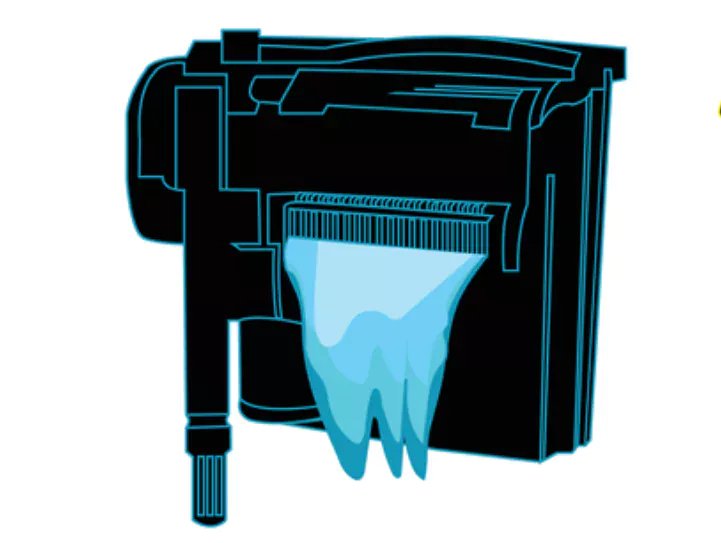
Hang on back (HOB) filters are usually made up of an impeller that pushes water through various filter media. They can be used in both fresh and saltwater tanks and some HOBs have adjustable flow rates so you can control the amount of water being filtered at any given time. This makes them ideal for small tanks or community tanks where you want to provide different levels of filtration for different species of fish.
4- Internal Filter
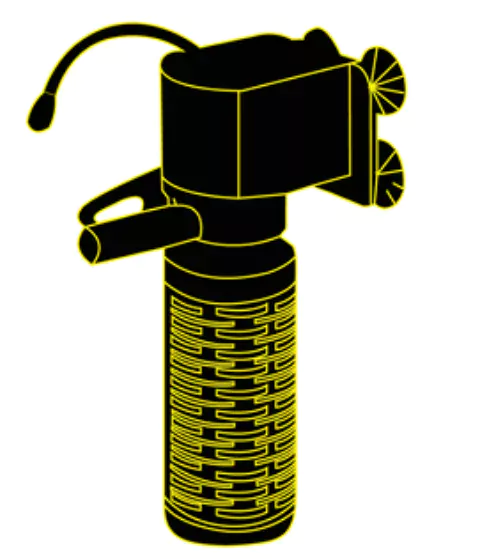
An internal filter is usually a small box that sits inside your aquarium and connects to the intake tube for water to flow through it. It has a foam or sponge filter pad inside which catches dirt and debris from the water before it goes back into the tank. They are generally quiet and easy to use as they can be left running while you’re not at home.
However, they don’t work as well as external filters because they don’t have as much space for media (foam) so they don’t clean as well. They also need more maintenance than external filters because you will have to replace this media every few months depending on how dirty your tank is and how big your filter is. They are also less powerful than external filters since they only have one stage of filtration instead of two (more on that later).
5- Undergravel Filter
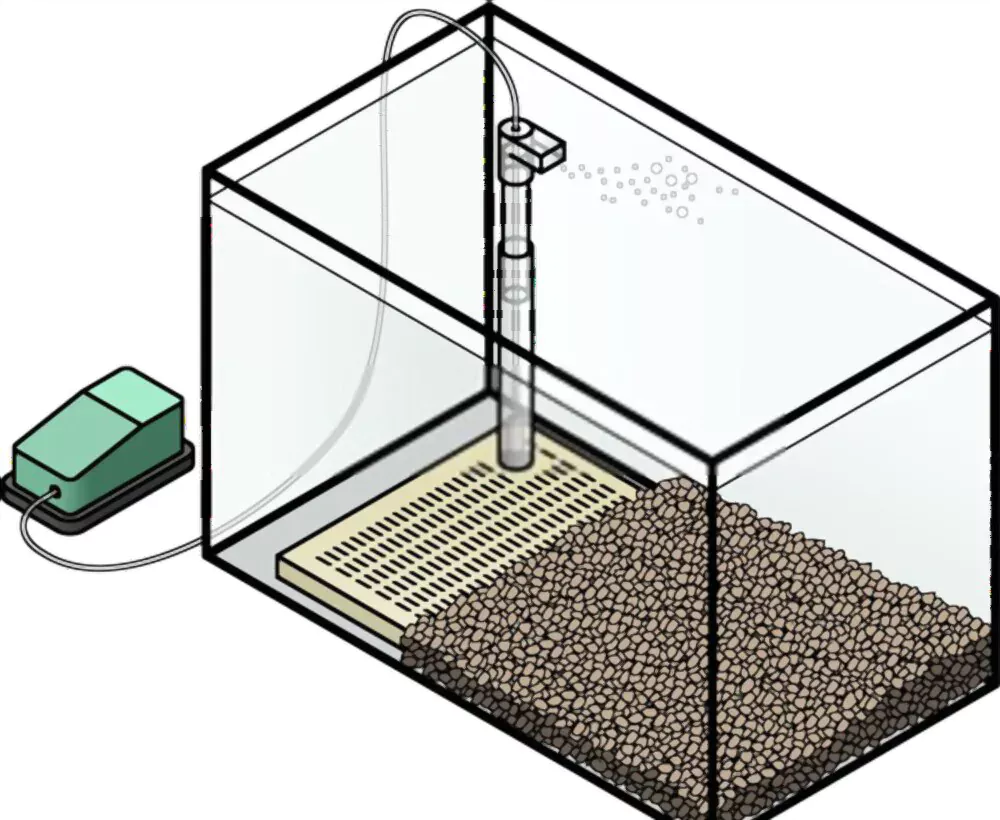
An under gravel filter (UGF) is an excellent choice if you have fish that are sensitive to high water temperatures or ammonia levels in their water. These filters sit underneath the gravel in your aquarium, which allows more oxygen into your fish’s environment than other types of filters do.
They also help keep nitrate levels low by removing waste particles from your aquarium water and releasing them into the air above your tank instead of letting them settle back down into your aquarium’s substrate. A UGF requires monthly maintenance so that you can clean out any build-up around its intake tube and replace any lost media (such as activated carbon or bio-balls).
6- Canister Filter
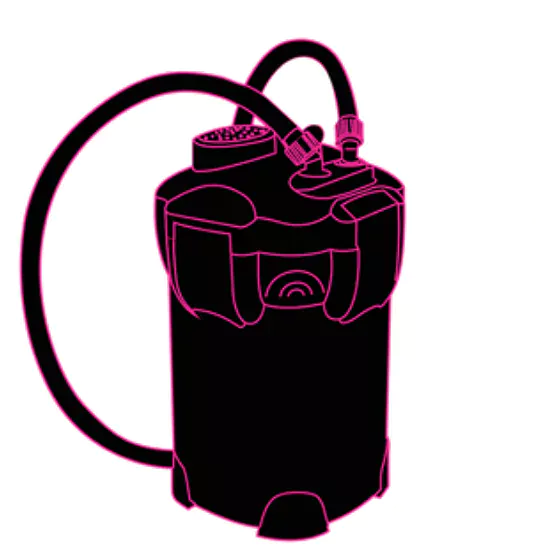
A canister filter is another popular type of aquarium filter that does not take up much room in your tank because these are external filters that sit outside of your aquarium and usually come with their own pump which pumps water into the canister itself. A filter media sits within this canister where it catches any particles before being pushed back out through an outlet on the side of the unit. Canister filters are more expensive than internal filters but provide better filtration for larger tanks or those which house sensitive species of fish such as discus.
What Kind Of Filter Does A Betta Fish Need?
The best filter for a Betta fish tank is a sponge filter. This filter will keep the water clean and healthy while making sure that your Betta doesn’t get stressed out.
Betta fish are very sensitive to high levels of ammonia and nitrates in their tank, which can be caused by poor maintenance or overfeeding. A good sponge filter will help keep these levels low, by capturing any waste before it has a chance to build up.
Sponge filters are easy to maintain. You just need to rinse them out once every week or so and change the water more frequently if you see signs of algae growth (which means the water isn’t being cycled properly).
Benefits Of Having A Filter In Your Fish Tank
There are many benefits of having an aquarium filter. I have mentioned a few of them below:
1- Filter Keeps The Water Healthy
As mentioned above, a filter will remove all sorts of dirt and debris from the water in your tank. This means that there will be no algae or other particles floating around there which could potentially harm your fish. The water will also be much cleaner, which means that the fish won’t have to work as hard when they breathe and this makes them healthier overall.
2- Filter improves Oxygen Levels
When you use a filter on your tank, it improves oxygen levels in the water which means that it’s easier for your fish to breathe properly. They won’t have such a hard time trying to get oxygen out of the water because it’s already there for them. By increasing oxygen levels in the aquarium, you’re also helping to increase growth rates for plants as well. Something else that helps make your aquarium look more appealing!
3- Filter Reduces Ammonia Levels In The Water
If you have ever owned an aquarium before, then you know how much work it can be when you have to clean the entire thing out after it has become polluted with ammonia from dead fish waste or other materials floating around there. If you have a good filter, then this will not happen as easily because it will help reduce the amount of ammonia in the water by filtering out any trash that might cause this problem in the first place!
4- Filter Prevents Algae Growth
Algae is actually a plant, but it can grow quickly in an aquarium environment if there are not enough nutrients present or if there is too much light hitting the surface of the water. Filters help prevent algae growth by providing more nutrients and taking away excess light from your tank’s surface.
5- Filter Removes Waste From The Tank
All fish produce waste as part of their normal metabolic processes and this waste builds up over time if it’s not removed from the tank on a regular basis through filtration systems such as filters or siphons (which remove waste manually). The more wastes that build up in a tank, the more likely it is that something like algae will take hold because it feeds off these wastes as well as natural plant nutrients from food thrown into tanks.
6- Filter Removes Harmful Bacteria
One of the main benefits of having a filter in your fish tank is that it helps keep harmful bacteria out of the water. This prevents any illness or disease from spreading through your fish population, which could ultimately lead to death for some of them. If you don’t have a filter on your tank, then it’s possible that you could end up with sick or dead fish if they come into contact with damaging chemicals like chlorine or other toxins found in tap water supplies.
Downsides Of Having A Filter In Your Fish Tank
As you know everything has its own disadvantages as well. Filters also have some disadvantages. A few of them are mentioned below:
1- Filters Need To Be Cleaned And Changed
One of the biggest disadvantages of having a filter in your fish tank is that you will have to clean it regularly. You need to clean it after every few weeks or months depending on how often you are feeding your fish. If you are not cleaning the filter regularly, then there are chances that algae could grow on it which can be fatal for your fish.
2- Filters Use Up Energy
Another disadvantage of having a filter in your fish tank is that it uses up a lot of energy and this can cause an increase in your electricity bill. If you want to avoid this problem, then make sure that you choose an efficient filter for your fish tank so that it does not consume too much energy while working properly.
3- Filters May Cause An Imbalance In pH Level
Another disadvantage of having a filter in your fish tank is that it can cause an imbalance in the pH level of your water which can result in an increase in ammonia levels and other harmful chemicals in your fish tank. This will not only affect the health of your fish but also its lifespan.
4- It May Get Clogged Up
Another disadvantage of having a filter in your fish tank is that it can become clogged up with dirt, debris, and waste material from the water over time. When this happens, these filters will no longer function properly and thus affect the quality of water that flows through them. This may lead to serious health problems for your fish who will not be able to breathe properly if there is too much waste material in their environment.
5- Filters Can Be Expensive
Another disadvantage associated with using filters is that they can be expensive. You will have to spend money on buying filters and cleaning them regularly as well as on replacing them when they get damaged or break down due to regular use over time.
What To Look For In A Filter For Your Betta?
The following factors should be taken into consideration while buying a new fish tank filter for your betta fish:
1- Size
The size of the aquarium filter depends on your tank size. If you have a large tank, a larger filter will be needed to handle all the water flow without clogging up. You should also consider how many fish you want in the tank when selecting a filter size. If there are a lot of fish, then more filtration power is needed to keep them healthy.
2- Noise
Quieter filters are better for people with small children who want to sleep at night or for people who plan on watching TV while their fish swim around in the tank. It’s best if the sound emitted by your filter doesn’t get louder than 60 decibels (dB). Any louder and it could disrupt other activities in the house like watching television or sleeping! If you can barely hear it from across the room, then it’s probably good enough for you!
3- Water Circulation
This is probably the most important characteristic that you want from your filter. If the water does not circulate well then it is going to be harder for your fish to breathe and swim around in the tank properly. A good filter should be able to move around 50 gallons of water every minute, so it is important that you get something that does that well in order for your fish to be happy and healthy for as long as possible.
4- Easy Cleaning
You don’t want to spend hours cleaning out your betta fish filter every week or so because it can become very tedious and boring after a while if you don’t like cleaning things up all the time anyway (or if you don’t have much time on your hands). So make sure that any filter that you buy has an easy cleaning system built into it so that it doesn’t take too long
5- Flow rate
The flow rate of your filter is how quickly it can push water through the media and out of the filter. Think of it as how quickly it can clean the water in your tank. If you have a large tank, you probably want a higher flow rate, while smaller tanks will likely need something slower and more gentle.
6- Noise level
The noise level is how loud the filter is when it’s running. You don’t want something too loud that it keeps you up at night, but if you get one that’s too quiet then it’s not doing its job properly either!
7- Material type
The material type determines what kind of media you can use in your filtration system, so think about what types of media work best with each type of filtration system before making your choice! For example, if you’re using sponge filters then you’ll need sponges made specifically for them.
Frequently Asked Questions (FAQs)
Is Waste Broken Down Naturally Without A Filter?
The answer is yes, but it takes a very long time. The waste from fish, snails, and shrimp can be broken down by soil bacteria, and this happens naturally, without the need for a filter. It’s possible to maintain a healthy aquarium without using any filters at all.
But you need to understand that there are two types of waste produced in an aquarium:
- Dissolved Waste
- Suspended Waste
Dissolved Waste consists of ammonia (NH3) and nitrite (NO2). Ammonia is produced when fish excrete nitrogen, while nitrite is produced when ammonia is broken down by beneficial bacteria. Both of these compounds are toxic to fish and must be removed from the water by filtration before they can build up to dangerous levels.
Suspended Waste consists of small particles such as fish poop and uneaten food. These particles float around in the water until they either fall to the bottom or are eaten by scavengers like snails and algae eaters. If left unchecked, suspended waste will make your water cloudy and foul-smelling over time.
Each waste type requires a different method and process to be removed from the water. If you tank my opinion, take the easy way and use the filter. It will take care of all the waste produced in a tank.
Will A Filter Hurt A Betta Fish?
The answer depends on the type of filter you’re using. If it’s a small, internal power filter (i.e. not a canister filter), then no, it shouldn’t cause any harm to your betta fish.
However, if you have one of those big external filters with a built-in pump, then yes, it could be quite harmful to your betta. These kinds of filters are made for larger tanks and are often used in community aquariums (tanks with multiple fish). They’re also known as “hang-on-back” filters because they hang off the back of the tank.
When these types of filters are used in smaller tanks, they can quickly suck up all the oxygen from the water and make it impossible for your fish to breathe. In other words, a filter can cause harm if it is too strong for your Betta. This is why it’s important to always check the recommended size of any filter before buying it and never use them in smaller tanks than what they were designed for!
How To Tell If A Filter Is Too Strong For A Betta
The best way to determine if your fish filter is too strong for your betta is by testing out how much current it produces. This can be done by placing an object into the water flow and seeing how much resistance it puts up against the stream of water. The more resistance there is, the stronger the filter will be.
Another way to check if your betta fish filter is too strong for your betta fish would be to see if they have any problems swimming against it. If they seem like they are having trouble swimming against it, then this means the filter is strong for your betta fish.
And also, If you have an aquarium with a submersible pump or even a hang-on back filter, then you should be able to adjust how much water pressure this produces by simply turning down the flow rate knob on the side. If you don’t know how to do this, then contact customer service or read the guideline from the user manual of the filter.
Can I Turn My Filter Off At Night?
Yes, you can turn the filter off at night and let your tank run without it for a few hours. However, if you have a heavy load of fish and plants, you may want to leave it on 24/7. The only thing that will happen is that your water will be cloudy for a few hours after turning off the filter.
Which Is The Best Filter For Betta Fish?
If you take opinion, Tetra Whisper Internal Filter is the best filter for betta fish aquariums. It’s a great product and it is very easy to install. The filter is powerful enough to keep your tank clean and healthy. It’s also very quiet so your Betta won’t be disturbed by its sound.
The only downside is that it is not an external filter, so it doesn’t have any kind of display panel or anything like that. You can only tell when it’s time to clean it by looking at the back of your tank and seeing if there are any bubbles coming out of it.
Final Thoughts
I know it may seem like having a filter in your tank is one of the difficult things to do. But honestly, it is not that hard. Although, betta fish care is very complicated and involves lots of information that a beginner can understand. But if you follow the provided information, you will be good to go.
I know if you love your betta fish, you will do anything to make it happy. I hope this article (Does Betta Fish Need A Filter) is going to help you to better care for your beautiful pet and make it live longer. And if you have any questions please feel free to ask in the comment section. I will do my best to answer it.

